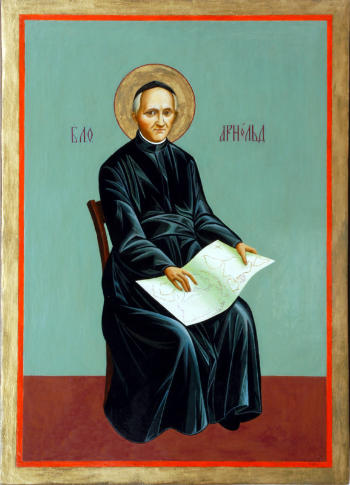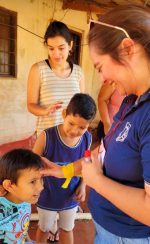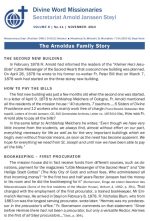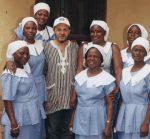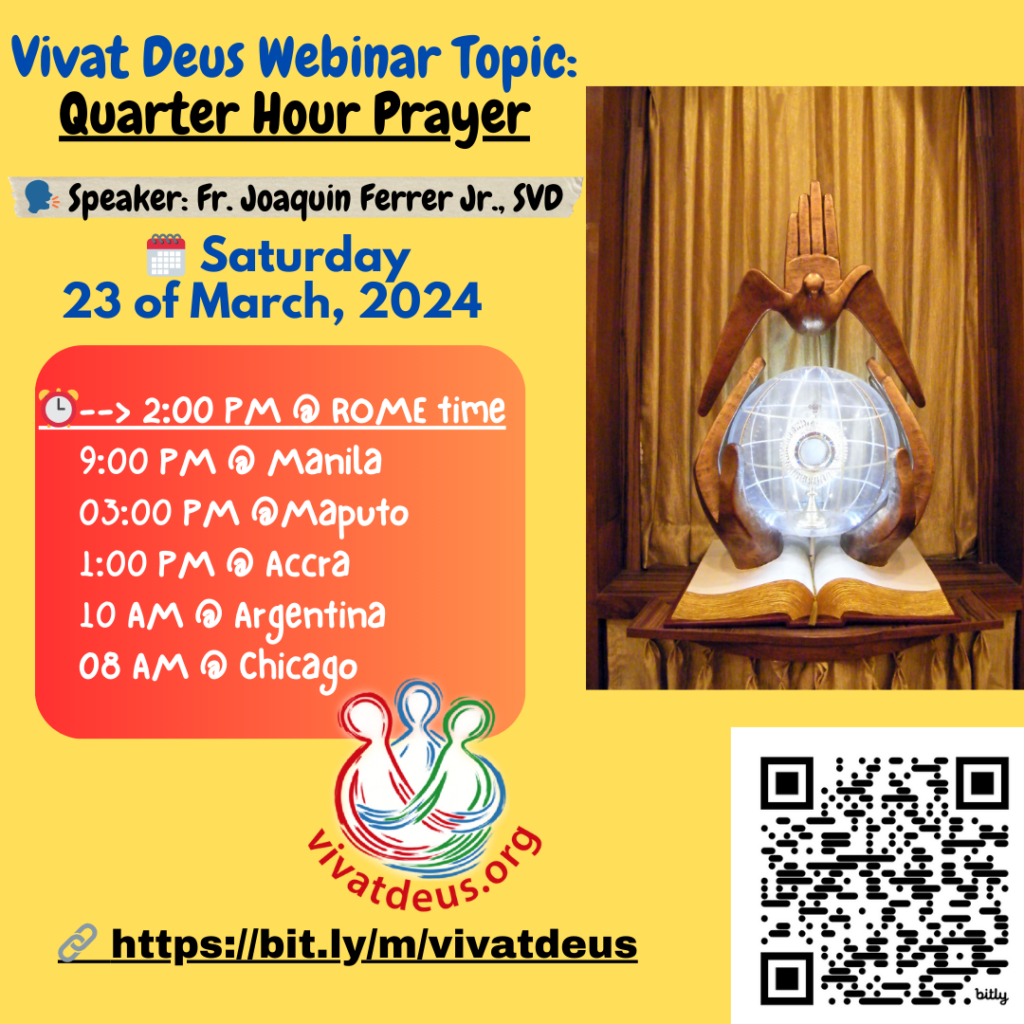The familiar saying from Dante’s Divine Comedy “In your will is our peace” would be a good motto for Fr. Arnold’s life. When he was appointed to work as director for the Apostleship of Prayer, he began to understand that as we honor the Sacred Heart of Jesus, we must also begin to unite ourselves to the intentions of that Divine Heart. He often quoted St. Paul, “Have this mind in you which was in Christ Jesus” (Phil 2,5). And he built up a spiritual ideal that “the best form of devotion to the Heart of Jesus is to make our wishes conform to those of the Heart of Christ… As Jesus, we should live our lives not for our own honor and glory, but according to God’s will and for his glory.”
Acting on his conviction that all decisions were to be channeled through fervent prayer seeking the will of God, he showed that he did not keep his spiritual ideal only in the realm of thought and reason. Fr. Arnold took the Word of God in Scripture seriously and when he read St. Paul’s words: “This is the will of God your sanctification” (1 Thes 4,3), he considered this a mandate for himself and his missionary society. He told his followers that sanctification is God’s work but it requires our cooperation. He was deeply convinced that an essential feature of surrender to God is the desire to have his will concerning us fulfilled in every regard… Then God will enlighten us and bring us to sanctity and enable us to do all things in him who strengthens us (Phil 4,13).
Fr. Arnold was convinced that God’s will is made known to us in the concrete circumstances of life. He reflected prayerfully on the Incarnation and believed that as God sent his Son into the world as man to teach us who God is and how to follow God’s will, so God continues to let his will be known through human agents and the happenings he allows in our lives. Always attentive to the Word of God that is living and active in Sacred Scripture, he admonished his priests, brothers and sisters to find God’s will in the events of their lives. God, he felt, does not allow anything to happen to us, except for his own purposes. It is important for us to recognize
God at work in our lives. Fr. Arnold always returned to the basic teaching of St. Paul that had so captured him when he began his work for the Apostleship of Prayer: “Have this mind in you which was in Christ Jesus.” He was convinced that striving to put on the mind of Christ would lead one to become aware of and to follow God’s will, because Jesus came only to do the will of the Father.
Fr. Arnold studied the Word of God in an effort to form his mind and heart according to the mind of Christ. This was the first step in seeking God’s will. He searched all sides of any decision that was to be made. He also readily sought advice from many bishops and others in authority, since he considered that they would be speaking God’s will to him concerning the foundation of the mission seminary. Yet on some occasions he warned against consulting too many people. In a letter to the Deacon Hermann Wegener he counseled: “Regarding the advice you will seek, I advise you not to consult too many people. That will only confuse you. There is no certain way of knowing the will of God in this life; according to the teaching of the Church, we cannot even be sure of sanctifying grace. Each person has to make the main decision about his vocation himself. If God gives him the grace to embrace a more perfect state, and provided he obtains the agreement of his confessor and has reflected on this with God in prayer, then he can proceed. God enables those who seek him to find the right way to heaven and uses obedience so that the person can achieve the greatest grace.” We find in these words an insight into how Fr. Arnold sought the will of God in his own life: fervent prayer and seeking advice from a confessor or spiritual adviser.
In the early days of the mission house, Fr. Arnold’s strong belief that what he was doing was God’s will caused him to continue on even when the first collaborators, Fr. Bill and Seminarian Reichert left him and there was a possibility that the Seminarian Anzer would also leave him. He reflected at the end of 1875: “…even if the Lord in his inscrutable plan discards the first builders, in order perhaps to replace them with others who are better and more suitable, may the Lord do what he wills. May his will always be done. May he choose the instruments and discard them as he pleases.”
He prayed in that first year: “May God give us the grace to zealously seek his will and make ourselves more and more worthy of his heavenly blessings through the attainment of a simple and loving heart.”
As he was seeking permissions from various bishops regarding the founding of the mission house he met with many obstacles. Fr. Arnold expressed his struggle: “I have experienced periods of severe struggle and it seemed to me I would have to endure a crucifixion if I were to succeed. On top of that I experienced physical affliction and some adversity. But it seemed to me that to give up would be contrary to God’s will. So I hung on, continued working, and I have no doubt that God wants the project and that he is the true agens who deigns to use our poor hands for this purpose.”
For Fr. Arnold the will of God and religious obedience were as one. He once wrote: “Look upon the will of your superiors as the holy will of God and try to comply in all simplicity and sincerity.” He would have been deeply gratified to read the new document on authority and obedience from the Congregation for Institutes of Consecrated Life (May 2008): “To seek the will of God means to seek a friendly and benevolent will that desires our fulfillment… Obedience is not humiliation but the truth on which the fullness of human persons is built and realized. Hence, the believer so ardently desires to fulfill the will of the Father as to make of it his or her supreme aspiration.” In 1904/05 when six priests were appointed to the missions, Fr. Arnold asked them: “Please recognize the will of God in this call directed to you in religious obedience, humbly submit to it and accept it joyfully as a challenge.”
When selecting the Sisters to be sent to the missions, he instructed Sr. Josepha: “This matter may not be settled in haste nor unduly rushed; rather you must pray much and ask others to pray, and then reflect a great deal once you have obtained all the necessary information and asked those for their opinion who can give the most exact particulars in every respect… At the same time pray repeatedly to the Holy Spirit and call on the patron saints. The importance of a good choice is obvious. You have to follow the light from above in all simplicity but also with great care and endeavor to find God’s will as it manifests itself through the situation.” Again we see his recipe as it were for seeking God’s will.
Fervent prayer to know the will of God, he believed, would resolve any difficulties in the way of fulfilling it, as he wrote to Fr. Joseph Freinademetz in China regarding the acceptance of a local diocesan priest into the Society: “ If he so urgently wishes to become a member of our Society, he should begin to pray fervently for it, so that if it is indeed God’s will, the difficulties lying in the way will be resolved.”
Regarding the foundation in Brazil the Founder wrote: “If it is God’s will that we remain there, he will ordain things in such a way that his divine will is revealed.” When he wanted to establish a mission in Chile he wrote: “Since at the moment we cannot meet the requirements, it is not God’s will for us. So we cannot object if the two persons concerned… approach another congregation.” In regard to a college in Santiago: “If I take the view that I should not begin new projects on my own initiative but wait to see which way Divine Providence is pointing, I believe I act legitimately… Since Santiago is the capital of Chile and a college would make a great demand on the Society, this principle applies all the more and I must ask God to consider my weakness. If he wants us in Santiago he should tell us by clearly indicating his divine will… If we want to build a college and a church we will need far more money than we have. So I am waiting for some additional signs of God’s will.”
Always before establishing a new foundation, the Founder prayed and waited for the will of God to be more clearly revealed. In certain situations, as with the founding of the mission house in Techny, it became clear through various events that it was God’s will to proceed and he prayed that the new foundation would correspond to God’s holy will. In regard to a foundation in Palestine, he followed the reservations of his councilors and asked the Bishop to look for another congregation. He wrote: “We cannot take on the matter just yet; first the will of God must be more clearly revealed.”
In June of 1901 Fr. Arnold received a letter of fifty-five pages from Fr. Gier listing his failings and imperfections. This caused the Founder much suffering but he accepted it in great humility. In his address to the community at a feast day celebration on July 19, once again he mentioned his central thought of God’s will: “I greatly need prayers. The Society is growing fast. It is God’s will that each member dedicate himself to his work… I ask the eternal love of the Holy Spirit to grant me his love more and more… May [the Lord God] establish between us in all respects the relationship that should bind us according to his divine will.” In his farewell conference at St. Gabriel’s in June 1908, the Founder concluded his recommendations for the future of the mission house with these words: “May God’s will be done. This most holy will must always be adored.”
We can see from the various quotations, the “will of God” was all pervasive in Fr. Arnold’s life. Not only did he strive with all his ability to learn that will and follow it, but he repeatedly asked this of his priests, brothers and sisters. May his prayers for us continue to help all the members of his three foundations to do the same.
